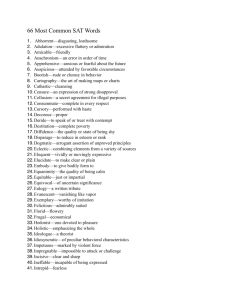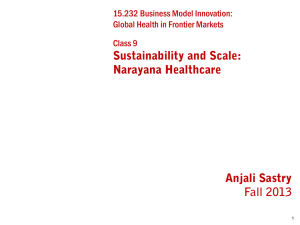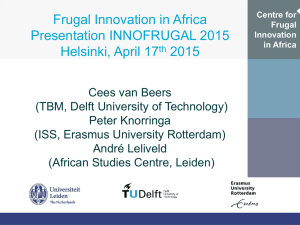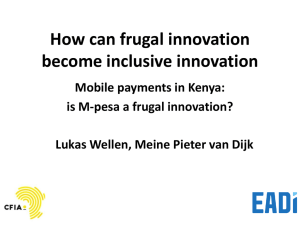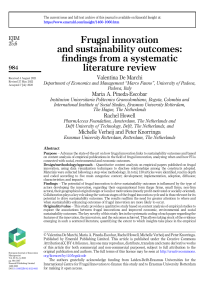Production & Operations Management
advertisement
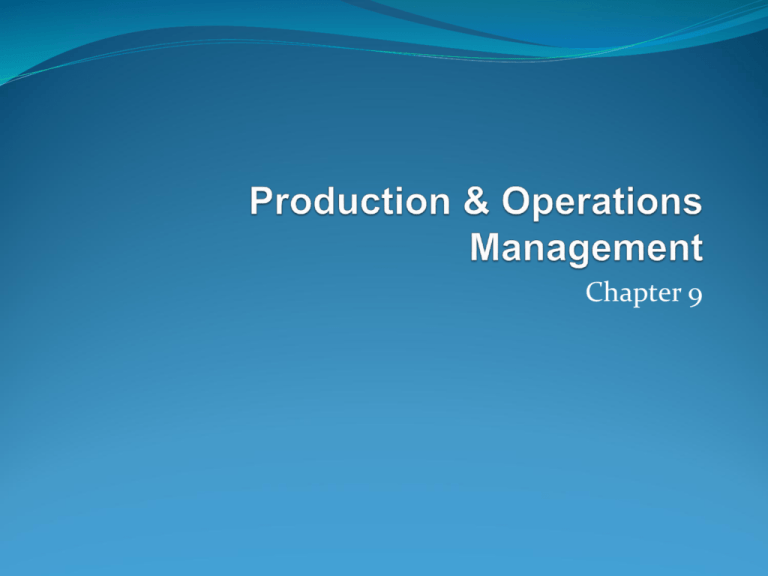
Chapter 9 Goals USA Manufacturing Production Operations Management Production Processes Production techniques that have improved productivity in USA Operations management planning issues Control Procedures USA Manufacturing In recent history manufacturing has declined while the service industry has grown 70% of US GDP comes from service sector 85% of jobs comes from service sector 25% of all goods produced in world come from US manufacturing sector (largest % in world) This means that we must study how to produce goods and services Manufacturing industries doing well: green technology, nanotechnologies, biotechnologies Tesla Motors (Electric carmaker) Solyndra (solar company) Codexis (biofuels firm) 3M (nano research done by 3M for adhesives, LCD displays and more) Production Operations Management Production The creation of finished goods and services using the factors of production: land, labor, capital, entrepreneurship and knowledge. Production Management Term used to describe all the activities managers do to help their firms create goods Operations management Term used to describe all the activities managers do to help their firms create goods and services Converting resources into goods and services Operations Management Product creation, development, production, distribution, managing purchases, inventory control, quality control, storage, logistics and evaluations A great deal of focus is on effectiveness & efficiency of processes Substantial measurement and analysis of internal processes in order to become more effective and efficient http://www.managementhelp.org/ops_mgnt/ops_mgnt.htm What Is Operations Management Like At: Appliance Manufacturer (Product) Operations Management take raw materials, human resources, parts, supplies, paints, tools and more to make appliance Example: Dacor kitchen wear http://www.dacor.com/About-Us/The-Dacor-Family.aspx List of companies manufacturing appliances in USA http://www.ssrsi.org/Made%20In%20%20USA/apliances.htm Sears (Retail, Finance & Repair - Product & Service) Operations Management covers everything: purchases, sales, finances, repairs 6 What Is Operations Management Like At: Colleges (Service) Operations Management take information, teachers, buildings, computers, students and creates a service that transforms students into educated people Hospitals (Service) Hospitals Operations Management take information, buildings, high-tech machines, computers, supplies, highly skilled labor and creates a service that transforms sick people into healthy people 7 Form Utility The value added by the creation of finished goods and services, such as: The value added by taking silicon and making computer chips Putting services together to create a vacation package The value added by taking wood, paint, labor, packaging, and other costs and making a boomerang Goal of production (Andrew S. Grove – Intel) Build and deliver products that customers demand at a scheduled delivery time Acceptable quality Lowest possible price Production Processes Process Manufacturing That part of the production process that physically or chemically changes materials Examples: Poor the steel into the mold to make parts for excavator Cook steak, vegetables and rice Assembly Process The part of the production process that puts together components Examples: Assemble parts to make excavator Assemble steak, vegetables and rice to make dinner 10 Production Processes Continuous Process A production process in which long production runs turn out finished goods over time Examples: Tortilla factory or lumber factory Intermittent Process A production process in which the production run is short and the machines are changed frequently to make different products Examples: Auto factories can switch between models Bakers can make cakes and pies and tarts 11 Production techniques that have improved productivity in USA CAD (Computer-aided Design) The use of computers in the design of products CAM (Computer-aided Manufacturing) The use of computers in the manufacturing of products CIM (Computer-integrated Manufacturing) One machine that does both CAD and CAM Expensive but cuts manufacturing costs dramatically Examples: http://www.youtube.com/watch?v=nvZBtJncEM&feature=related 12 Production techniques that have improved productivity in USA Mass Production (Perfective in US by companies like Ford) Make a lot of one thing Like Henry Ford did Flexible Manufacturing Designing machines to do multiple tasks so that they can produce a variety of products http://www.youtube.com/watch?v=cb-I4FhF36Q&feature=related Lean Manufacturing (Originated in Japan) Manufacturing that uses fewer inputs (resources) to make the same number of outputs than before. Increase productivity. Reduce labor hours, waste, defects, floor space, inventory http://www.youtube.com/watch?v=AUPji7L9aSs&feature=related 13 Production techniques that have improved productivity in USA Mass Customization Tailoring products to meet the needs of individual customers on a mass scale Examples: Dell – design your own computer Vans shoes – design your own shoe Colleges – design your own degree Season Tickets to Mariner Games 14 Reverse Innovation or Frugal Innovation (Originated in emerging markets) Reverse Innovation or Frugal Innovation What are needs of poor create product “Turbo Charged Lean Manufacturing” Examples: Tata Motors (Indian Company) makes $2200 car Kenya leads the world in mobile phone money transfer GE R & D labs in Bangalore, India makes hand-held ECG (electrocardiogram) for $800 (instead of $2000) TCS (India) create inexpensive water filter from rice husks (waste product) Narayana Hrudayalaya Hospital (India) Heart Surgery for $2000 (same success rate as US) BYD (China) makes lithium batteries for $12 (instead of $40) Reverse Innovation or Frugal Innovation Key ideas: Dramatically reduce costs by: Redesign products & processes Applying division of labor (expert does what they are expert at) and economies of scale in new areas like surgery Listening to what the poor need Product must be tough and easy to use Use minimal raw materials Not harsh on environment Reverse Innovation or Frugal Innovation Rethinking Production processes: Contract out more work and stick to core competency Use existing technology in new ways Computers are rare in India and TVs are common, so TCS designed a box that connects mobile phone (can get internet) to TV Narayana Hrudayalaya Hospital 1000 beds instead of more common 200 (economies of scale) Surgeons can specialize in one operation and become that best at the one operations Operations Management Planning Issues (Manufacturing And Service): Facility location Facility layout Materials requirement planning Purchasing JIT (just-in-time inventory) control Quality control Operations Management Planning Facility Location The process of selecting a geographic location for a company’s operations Considerations: Less expensive property, labor, logistic costs Location, Location, Location Attractive communities to live in – life style to attract employees Are suppliers close? Are there enough customers or employees? Tax breaks Can we just do things on the internet? Retail or engineer? Operations Management Planning Facility Layout The physical arrangement of resources (including people) in the production process Products: http://www.youtube.com/watch?v=AUPji7L9aSs&feature=rel ated Services: Aravind Eye Hospital (India): 4 operating beds next to each other and 2 doctors Operations Management Planning MRP (Material Requirement Planning) A computer-based production management system that uses sales forecasts to make sure that needed parts and materials are available at the right time and place (for a single firm) ERP (Enterprise Resource Planning) A computer application that enables multiple divisions or firms to manage all of their operations (finance, requirements planning, human resources and order fulfillment) on the basis of a single, integrated set of corporate data ERP Programs help to bring operations management to the Internet Operations Management Planning Purchasing The function in a firm that searches for quality material resources, finds the best suppliers, and negotiates the best price for the goods and services Pays all bills that allow discounts during the discount period 2/10/net 30 $1000 owed Discount if pay within 10 days = $1000*.02 = $20 $20 discount for paying 20 days early Annual rate earned = (1+.02)^(365/20)-1 = 43.53% Operations Management Planning JIT (Just-in-time Inventory Control) The production process in which a minimum of inventory is kept on the premises and parts, supplies, and other needs are delivered just in time to go on the assembly line Reduces storage costs, facility space, obsolesces Requires close ties with suppliers Operations Management Planning Quality Consistently producing what the customer wants while reducing errors before and after delivery to the customer The before in the most important Statistical Quality Control (SQC) Statistics used to continually monitor quality Six Sigma Quality (Six Standard Deviation Quality) A quality measure that allows only 3.4 defects per million opportunities Control Procedures Pert Charts (Critical Path) A method for analyzing that tasks involved in completing a given project The Critical Path is the path that takes the longest and this is most critical to avoid delays on this path Gantt Charts Bar graph showing production managers what projects are being worked on and what stage they are in any given time How Manufacturers Have Become More Effective Focus more on customers Maintain close relationships Continuous improvement Focus on quality Save costs through site selection Rely on the Internet to unite partners New production techniques Looking overseas to get new ideas for production and innovation in providing goods and services
